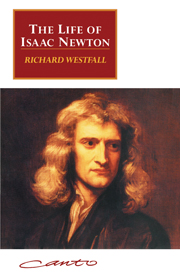Book contents
- Frontmatter
- Dedication
- Contents
- Preface
- Acknowledgments
- A Note About Dates
- Plates
- 1 A Sober, Silent, Thinking Lad
- 2 The Solitary Scholar
- 3 Anni Mirabiles
- 4 Lucasian Professor
- 5 Publication and Crisis
- 6 Rebellion
- 7 Years of Silence
- 8 Principia
- 9 Revolution
- 10 The Mint
- 11 President of the Royal Society
- 12 The Priority Dispute
- 13 Years of Decline
- Bibliographical Essay
- Index
8 - Principia
Published online by Cambridge University Press: 05 September 2013
- Frontmatter
- Dedication
- Contents
- Preface
- Acknowledgments
- A Note About Dates
- Plates
- 1 A Sober, Silent, Thinking Lad
- 2 The Solitary Scholar
- 3 Anni Mirabiles
- 4 Lucasian Professor
- 5 Publication and Crisis
- 6 Rebellion
- 7 Years of Silence
- 8 Principia
- 9 Revolution
- 10 The Mint
- 11 President of the Royal Society
- 12 The Priority Dispute
- 13 Years of Decline
- Bibliographical Essay
- Index
Summary
THE BACKGROUND to Halley's visit to Cambridge in August 1684 was a chance conversation of the previous January. By his own account, Halley had been contemplating celestial mechanics. From Kepler's third law, he had concluded that the centripetal force toward the sun must decrease in proportion to the square of the distance of the planets from the sun. The context of his statement implied that he arrived at the inverse-square relation by substituting Kepler's third law into Huygens's recently published formula for centrifugal force. He was not the only one who made the substitution. After Hooke raised the cry of plagiarism in 1686, Newton recalled a conversation with Sir Christopher Wren in 1677 in which they had considered the problem “of Determining the Hevenly motions upon philosophicall principles.” He had realized that Wren had also arrived at the inverse-square law. It is clear that the problem Hooke put to Newton in the winter of 1679–80 was one that several people defined for themselves at much the same time. It was, indeed, the great unanswered question confronting natural philosophy, the derivation of Kepler's laws of planetary motion from principles of dynamics.
- Type
- Chapter
- Information
- The Life of Isaac Newton , pp. 159 - 190Publisher: Cambridge University PressPrint publication year: 1994

